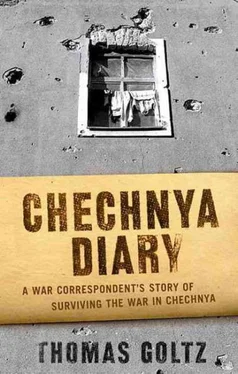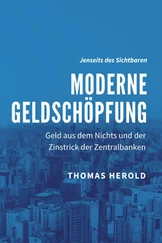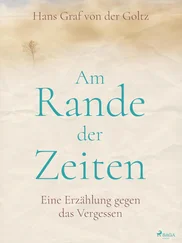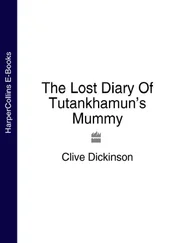I was on my own. Or rather, it was time to check in with my own Baku network to see what was really what. I called a well-informed diplomat pal and arranged to meet him at a bar favored by the pan-Turkic crowd known as the Gray Wolves, who were said to be actively supporting the Chechens with men and arms. Even before the diplomat arrived I had the scene assessed, but he filled in more gaps. The Russians had intercepted a satellite telephone conversation between Djohar Dudayev and the Azerbaijani Gray Wolf leader, Iskender Hamidov, and leaked the entire transcript to the Moscow press. In it, Iskender reassured Djohar that “another delivery of ‘metal’” from Turkey was on its way via Dagestan, and that more of his men were scheduled to slip across the frontier and join in the good fight.
It was pretty damning material, and suggested open collusion between Dudayev, Hamidov, and his Turkish backers against the Russians. It was also highly embarrassing to Azerbaijani President Heydar Aliyev, because the content of the conversation suggested that he either tolerated anti-Russian activities on his fiefdom, or that he was out to lunch and unaware that any such activities were going on. This was all bad news.
I still had a few strings to pull, however. The first was to make direct contact with Iskender Hamidov and see if I could hitch a ride with him and his men if and when he made another cross border run. While putting out feelers in this direction (I assumed his phones were tapped by everyone with an interest in the internal politics of Azerbaijan), I also called on another old friend. I shall call him “Towfiq,” a man whose business interests included stolen cars and Chechen drivers.
“This is me,” I said into the telephone.
“My dear!” Towfiq exclaimed. “I thought you had left us for good!”
“All lies,” I replied. “But I must see you— now.”
“I will pick you up in ten minutes.”
He was there in five
“My dear, it is so good to see you again!” Towfiq began with the standard niceties. “A problem at customs? A woman? Are you moving back to us and need a house? I have one that is empty now. I am married and I got rid of my mistress. You can have her, too, and both our problems will be solved.”
“Congratulations on your marriage.”
“Thank you.”
“Introduce me to your Chechen friends.”
At two o’clock I was standing on the quayside near the disused tennis club, trying hard to look like I was doing something other than waiting. At five minutes after the hour two men crossed the street.
One was short, dark, and ugly. He wore a leather jacket that looked like it concealed a weapon tucked in his belt, and had a shabby, gray papakh crushed down around his ears that looked like the conical hat was upside down. The other was tall, fair-haired, and handsome. He wore a maroon mackintosh-style overcoat, but no hat at all. They were, I decided, the hit man and the boss, respectively. They introduced themselves as Isa and Hamid, and suggested we go some place quiet to talk.
I had already selected the apartment of a best-nameless opera singer-cum-oil company caterer as a safe house. It was the least likely place I could think to be bugged. We split up and found our own ways to the address, met on the second floor, and entered without saying a word before turning the stereo on high. (Verdi, I believe.) We had a tentative deal within an hour, predicated on a mixture of patriotic zeal and self-interest.
I had envisaged a mountain-goat path over the snow; they insisted on a straight shot through the front door—the Golden Bridge across the Azerbaijani-Russian frontier.
Decisions had to be made. I could put my life in the hands of two total strangers of an ethnic persuasion notorious for crimes such as kidnapping, or pursue the Gray Wolf option and go with men I at least knew—but did not think much of. I could also declare that it all had become too complex and dangerous and simply back out and go home to Montana and spend the winter skiing. I needed consultation, so I went up to the Martyrs’ Lane Cemetery to walk around the graves of friends and acquaintances killed in Karabakh—but none of the dead could tell me what to do. So I took a long stroll downhill in the direction of the Foreign Ministry. By chance, two old friends who worked inside were standing out front smoking cigarettes. They were the deputy foreign minister and his assistant, or more specifically, my old friends Araz and Elchin.
“Iskender Hamidov is making our lives rather difficult right now,” commented Elchin, the assistant. “Russia is talking about closing the frontier due to his antics.”
“I am merely a public servant in the government of a small and confused country, and hardly in the position to advise you about the preferred way to violate our frontiers, let alone those of our neighbors,” said Araz. “But, as your friend I would strongly advise you to stay away from the politicians and travel with the businessmen.”
“Meaning—”
“The interests of the latter are constant—money; the interests of the former change according to exigency. And all indications are that a crackdown is coming.”
I made two calls from the street. The first was to Iskender Hamidov’s organization. It was designed to throw anyone interested in my movements off the track. I said I would call the next day to make final arrangements for the trip north. Then I found a second telephone and called Isa and Hamid and confirmed that we were leaving that night.
We were stopped seven more times between the Golden Bridge and the Dagestan capital, Mahachkale, and each checkpoint brought my colon into my throat. A brace of Russian soldiers would emerge from the darkness into our headlights and point to the side of the road. We would stop and nervously wait while the soldiers went through our documents.
“Bismillah, ” I would mutter, using the Muslim Arabic formula for evoking the name of God.
In Islamic historiography, celebrated as mysterious fact by millions of pilgrims to Mecca during the annual hajj, there is a story of the Prophet Muhammad. Pursued by the evil Quresh tribe, whose aim it was to stamp out monotheism and celebrate polytheism, he took refuge in a cave in Mount Arafat. The Quresh arrived at the mouth of the cave, only to discover a spider’s web hanging over the entrance. “He cannot possibly be here, otherwise the spider’s web would have been shattered,” reasoned the Quresh, and moved on—thus leaving Muhammad alive. The Prophet, through whom the religion known as Islam was delivered to mankind, lived. And now I was Muhammad in that cave across two hundred miles of Daghestani police and KGB checkpoints, because a spider’s web of innocence descended over my backseat place every time we were pulled over.
“Bismillah,” I would breathe, and become invisible.
We were stopped often and the drill was always the same. The uniformed men with guns would approach the driver’s window and ask for papers; the same men or their mates would shift over to the passenger window and demand the same—and then, when the two men sitting in front were cleared after a few questions, they would turn to the back seat.
“Bismillah,” I would breathe, as Isa faced the music.
Next came my turn.
It never came. It was as if I did not exist, that there was no fourth person in the car.
And as the bismillah night turned into the inchoate bismillah dawn, a near-atheist, non-Muslim like me had difficulty in ascribing my salvation to anything other than Divine Protection or Intervention, and of the Islamic variety, given the references and words and languages evoked in time of extreme need. Indeed, by the time we arrived at the Mahachkale train and bus station I was obsessed with two thoughts. The first was that I, traveling incognito, had passed eight security checkpoints on what should have been the most tightly controlled road in all of Russia, but that I was in , which was good, and no doubt the Will of God.
Читать дальше











